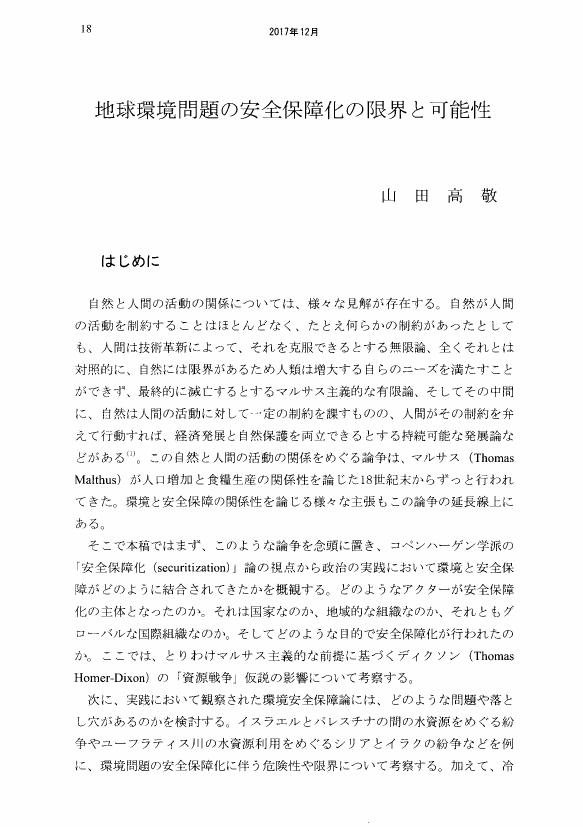2021年度の主な研究実績は、以下の2点である。一つは、2020年5月にベルリン自由大学の研究チームと共同でオンライン開催した会議の際に提出した論文を加筆修正した。もう一つは、2022年3月に開催された米国国際政治学会で研究成果を報告したことである。前者に関しては、『国際政治』掲載の論文から得られたデータを新たな基準(特に方法論に関して記述的な研究と事例研究の違いに関する基準を明確化)で分析し直し、米国のInternational Studies Quarterly及びInternational Organization、ドイツのZeitschrift fur Internationale Beziehungeなど海外学術誌のデータとの比較可能性を向上させ、さらに日本の特徴である低理論依存性が日本における外交史研究や地域研究の優位性と強い相関があることを統計学的に示した。その上で、改めて日本の国際関係論がグローバルな国際関係論に統合するポテンシャルについてコペンハーゲン大学のクリステンセンの研究などを参考に多角的に検討した。後者に関しては、上記の研究成果をドイツ側の研究者と共有した上で、さらに発展させ、その成果を上述の米国国際政治学会で報告した。報告では、グローバルな国際関係論の「中心」の外郭に存在する日本とドイツの国際関係論がどの程度「中心」に統合されているのかを欧米の学術誌への投稿論文の数や海外博士号取得者の数などのデータを基に分析し、さらにそのような統合を妨げる要因についても検討した。分析の結果、日独の研究者の大部分が自国内で学位を取得していているため「中心」からの独立性が高いという点や、日本ではドイツよりも母国語での研究成果発表に重点が置かれている点、さらにはドイツと比較して英語を媒体とする海外専門誌における日本人研究者のプレゼンスが低い点などが明らかとなった。
1 0 0 0 OA 地球環境問題の安全保障化の限界と可能性
- 著者
- 山田 高敬
- 出版者
- 国際安全保障学会
- 雑誌
- 国際安全保障 (ISSN:13467573)
- 巻号頁・発行日
- vol.45, no.3, pp.18-34, 2017-12-31 (Released:2022-04-01)
- 著者
- 山田 高敬
- 出版者
- 日本政治学会
- 雑誌
- 年報政治学 (ISSN:05494192)
- 巻号頁・発行日
- vol.68, no.1, pp.1_109-1_133, 2017 (Released:2020-07-01)
- 参考文献数
- 55
本稿は, 経済のグローバル化がグローバル・ガバナンスにおける権威のプライベート化をもたらし, それによりガバナンス目標の達成に非国家主体の協力を必要とする 「多中心的ソフト・ガバナンス (poly-centric soft governance)」 の状況が生まれていることをまずは指摘する。その上で, そのようなガバナンス状況に伴う目標喪失リスクを極小化するために政府間組織がオーケストレーション (orchestration) を実施する可能性を指摘する。さらに, そのようなガバナンス状況では経済的誘因が使われることが予想されるものの, どのようなガバナンス・メカニズムが有効なのかについては不確定性が高いため, 政府間組織によるオーケストレーションは自ずと異なる政策実験の管理・調整をめざすこととなる。最後に, 本稿は, このようなオーケストレーションが成功する条件として当該問題領域における政府間組織の 「中心性 (focality)」 に着目し, ケーススタディーとして国連企業人権指導原則 (UNGPs) の実施過程における国連企業人権作業部会 (UNWG-BHR) によるオーケストレーションを分析する。
1 0 0 0 OA 国際関係理論の日本的特徴に関する再検討―「輸入」と「独創」の観点から―
日本の国際関係理論は海外の諸理論の輸入に依存し、独自性に乏しいとされる。本研究は、過去の主要な理論に関して、その輸入の態様を洗い直し、そこに「執拗低音」(丸山真男)のようにみられる独自の問題関心や分析上の傾向を検出した。日本では、先行する歴史・地域研究を背景に、理論研究に必然的に伴う単純化や体系化よりも、現象の両義性・複合性を捉えようとする傾向が強く、また新たな現象と分析方法の中に、平和的変更の手がかりを摸索する場合が顕著にみられた。海外の理論を刺激として、従来からの理念や運動、政策決定に関する関心が、新たな次元と方法を備えたケースも多い。
- 著者
- 山田 高敬
- 出版者
- 財団法人 日本国際政治学会
- 雑誌
- 国際政治 (ISSN:04542215)
- 巻号頁・発行日
- vol.2004, no.137, pp.45-65,L9, 2004-06-19 (Released:2010-09-01)
- 参考文献数
- 75
- 被引用文献数
- 1
The challenges of global governance in the contemporary world are becoming increasingly complex in that solutions to many global issues ranging from poverty alleviation to environmental protection require the reformulation of the relationships among many competing policy goals. To the extent that such a reformulation of policy goals requires a change in a global public order (GPO), what makes the transformation of a GPO possible? More importantly, what kind of social mechanism is at work in creating a new “common knowledge” which integrates a new policy goal into the previous one? Is the same mechanism in effect for the entire process of GPO transformation?These are precisely the questions that this paper purports to answer. In so doing, it draws on the growing theoretical literature of constructivism with particular emphasis on the process of “socialization.” While “socialization” is generally believed to have two distinct mechanisms, namely “social influence” and “social persuasion, ” this paper argues that it is the combination and sequencing of these mechanisms that holds the key to the transformation of the existing GPO. It hypothesizes that a GPO is transformed in three evolutionary stages; at the first stage, a challenge is posed by a network of NGOs to the existing GPO through social influence; at the second stage, a new, more comprehensive GPO is germinated by stakeholder representatives through social persuasion, and at the final stage, the new GPO becomes propagated to the critical stakeholders through the mechanism of “social elucidation, ” which is a variant of social influence. Moreover, the paper argues that a different set of organizations is either used or created at each stage of development. For instance, at the second stage, a small, but inclusive organization is created to promote social learning among stakeholders' representatives.This evolutionary logic is then illustrated through a case study, which empirically traces the process that led to the formation of the World Commission on Dams (WCD), and to the creation of the Dams and Development Project (DDP) within UNEP. The former set the guidelines for the construction of large dams, and the latter “reinterpreted” them within each national context.The paper concludes with theoretical implications, which point to the fallacy of searching for a single covering law in explaining actors' behavior, often found in rational-choice theories, the fallacy of prescribing only one “optimal” organizational design, and also the myth of international anarchy in the world, which is increasingly characterized by various nongovernmental networks of “complex governance.”
